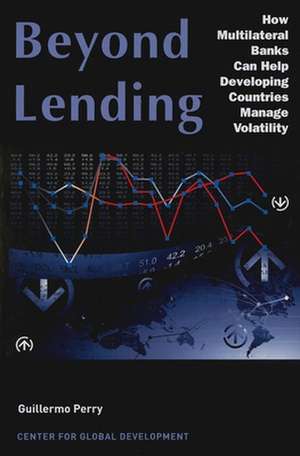Beyond Lending: How Multilateral Banks Can Help Developing Countries Manage Volatility
Autor Guillermo Perryen Limba Engleză Paperback – 5 mai 2009
When he began this book in early 2008, Guillermo Perry argued that developing countries remained highly vulnerable to external risks such as commodity price declines, capital flow reversals, and natural disasters. The economic crisis that has since ensued confirmed Perry's analysis. It has also made his proposal more important than ever: multilateral development banks (MDBs) should move beyond lending to provide innovative risk-management tools for developing countries to manage volatility. The risk that MDBs will fall into complacency as the short-term demand for traditional loans increases during the crisis should not deter innovations to ensure long-term stability.
Contents
1. Causes and Consequences of High Volatility in Developing Countries
2. The Role of Financial Insurance and Hedging
3. Dealing with Liquidity Shocks and the Procyclicality of Private Capital Flows
4. Dealing with Currency Risks
5. Dealing with Commodity Price, Terms of Trade, and Output Risks
6. Dealing with Natural Disaster Risks
7. Why Multilateral Development Bank Practices Are So Far from Their Potential
8. An Agenda Going Forward
Contents
1. Causes and Consequences of High Volatility in Developing Countries
2. The Role of Financial Insurance and Hedging
3. Dealing with Liquidity Shocks and the Procyclicality of Private Capital Flows
4. Dealing with Currency Risks
5. Dealing with Commodity Price, Terms of Trade, and Output Risks
6. Dealing with Natural Disaster Risks
7. Why Multilateral Development Bank Practices Are So Far from Their Potential
8. An Agenda Going Forward
Preț: 100.00 lei
Preț vechi: 122.36 lei
-18% Nou
Puncte Express: 150
Preț estimativ în valută:
19.13€ • 20.03$ • 15.83£
19.13€ • 20.03$ • 15.83£
Carte indisponibilă temporar
Doresc să fiu notificat când acest titlu va fi disponibil:
Se trimite...
Preluare comenzi: 021 569.72.76
Specificații
ISBN-13: 9781933286327
ISBN-10: 1933286326
Pagini: 98
Dimensiuni: 152 x 229 x 10 mm
Greutate: 0.2 kg
Editura: Brookings Institution Press
Colecția Center for Global Development
ISBN-10: 1933286326
Pagini: 98
Dimensiuni: 152 x 229 x 10 mm
Greutate: 0.2 kg
Editura: Brookings Institution Press
Colecția Center for Global Development
Notă biografică
Guillermo Perry is a nonresident fellow of the Center for Global Development. He was chief economist of the Latin America and Caribbean region of the World Bank from 1996 to 2007. Before joining the World Bank, Perry served his native Colombia in various capacities: minister of finance and public credit (1994–96); minister of mining and energy (1986–88); director of national taxes (1974–76); and deputy director of the Departamento Nacional de Planeación y Consejo Nacional de Política Económica (1970).
Descriere
When he began this book in early 2008, Guillermo Perry argued that developing countries remained highly vulnerable to external risks such as commodity price declines, capital flow reversals, and natural disasters. The economic crisis that has since ensued confirmed Perry's analysis. It has also made his proposal more important than ever: multilateral development banks (MDBs) should move beyond lending to provide innovative risk-management tools for developing countries to manage volatility. The risk that MDBs will fall into complacency as the short-term demand for traditional loans increases during the crisis should not deter innovations to ensure long-term stability.
Contents
1. Causes and Consequences of High Volatility in Developing Countries
2. The Role of Financial Insurance and Hedging
3. Dealing with Liquidity Shocks and the Procyclicality of Private Capital Flows
4. Dealing with Currency Risks
5. Dealing with Commodity Price, Terms of Trade, and Output Risks
6. Dealing with Natural Disaster Risks
7. Why Multilateral Development Bank Practices Are So Far from Their Potential
8. An Agenda Going Forward
Contents
1. Causes and Consequences of High Volatility in Developing Countries
2. The Role of Financial Insurance and Hedging
3. Dealing with Liquidity Shocks and the Procyclicality of Private Capital Flows
4. Dealing with Currency Risks
5. Dealing with Commodity Price, Terms of Trade, and Output Risks
6. Dealing with Natural Disaster Risks
7. Why Multilateral Development Bank Practices Are So Far from Their Potential
8. An Agenda Going Forward
